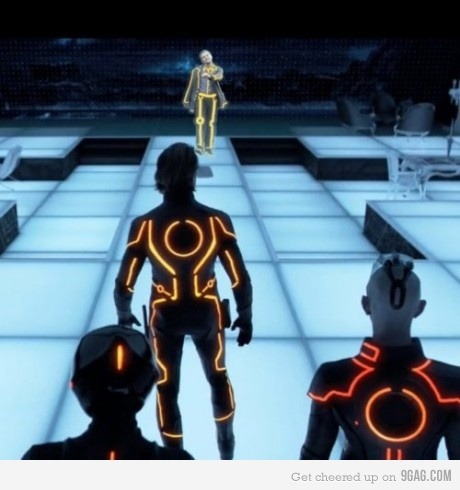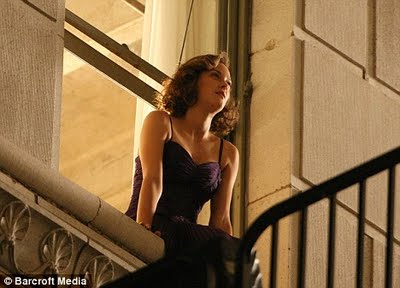 |
| Yes, I still love "f yeah strutting leo." |
And, as I watched certain movies and directors for the first time, I realized I'd want a special category for pix I mean to go back to. I also like the idea of writing a first review that's spoiler-free, then following that with a no-holds-barred piece. In fact, posting my "Inception" review before Oscar night made me decide to pull the trigger: I wanted a chance to write again with no fear of spoilers, & I knew I wanted to write about the music in the film.
"Inception" obviously got a bit of attention for its musical score. In fact, people were wildly touting a lot of the instrumental segments for weeks before someone noticed that a lot of the "dreamworld music" is the Edith Piaf song, "Non, Je Ne Regrette Rien," but slowed down or altered tremendously. That nearly caused an orgy of musical praise!
Hans Zimmer is a skilled and well-regarded composer, and has been for decades. Even those who didn't enjoy "Broken Arrow" might've actually liked the neo-Western score he created for it. Zimmer's work for Christopher Nolan seems especially blessed - "Batman Begins" has an exceptional soundtrack, as did "The Dark Knight." "Inception," for some, is the best in terms of sheer ingenuity.
I think that reworking the Piaf song was a very smart move - it's also appropriate to the film, of course, since time is passing more slowly depending on what "layer" the dreamers are in. I'm going to have to watch the picture for a second time just to pay attention to this one aspect.
And yet, I spent a long time thinking about a song that wasn't used by "Inception." In fact, it's a Nina Simone track I was playing off my phone as I walked from the train to the theater. Yes, I'm into jazz. Let me put up the youtube vid that carries the song. Don't watch it til later, it's just lovely pix of a certain talented woman. Read while you hear the audio, that's much cooler. And, like, modern.
Let's try the lyrics, shall we?
Trouble in mind/I'm blue/But I won't be blue always/Cause the sun's gonna shine in my back door some day/Trouble in mind/It's true/I have almost lost my mind/Never had so much trouble/In my life before/I'm gonna lay my head/On some lonesome railroad line/Let the 2:19 train ease my troubled mind"Trouble In Mind" is a 1924 song written by Richard M. Jones, a jazz pianist. First recorded with a singer called Thelma La Vizzo, it's been sung by Jerry Lee Lewis, Bob Dylan, Janis Joplin, and Johnny Cash. I've only heard two covers, but I'm willing to bet that none hold a candle to Nina Simone's version.
Trouble in mind/I'm blue/But I won't be blue always/Cause the sun's gonna shine in my back door some day/I'm gonna lay/Lay my head/On some lonesome railroad line/Let the 2:19 train ease my troubled mind
The lyrics can also vary from one musician to another (a stanza about, sigh, a rocking chair keeps popping up), but the lyrics Nina carries are both appropriate and spare. At first, the song may seem connected to "Inception" on a "subtle as The Washington Monument" level; after all, the picture below shows DiCaprio's Dom Cobb and the best plan he could come up with for himself and his beloved wife.
I dunno - better or worse than jumping off a skyscraper?
For my part, I can't imagine how broke-ass and dumb a person would have to be to settle on that method of suicide. It's quick, I'll give them that, but also really horrifying. And, I guess, symbolic of the aftermath of the Industrial Revolution, but I digress...
In the context of the picture, it makes sense that the dream world's most certain exit is one that is extreme enough to (a) successfully kill you and (b) shock your mind back to reality, while (c) not requiring you to do anything.
To that extent, yes, as I saw Leo and Marion Cotillard get down side by side on the tracks and stare at each other's faces, "Trouble in Mind" seemed incredibly appropriate.
But, of course, I think the song has a deeper thematic resonance to Nolan's intelligent blockbuster. Please, read those lyrics again and ask yourself what kind of feelings are running through the "I" in that song; does it sound like Cobb? Well, there's an LA Times interview entitled Hans Zimmer and Johnny Marr talk about the sad romance of 'Inception.' Here's a quote:
“I’m nearly resentful of the way people are describing this music as being smart and intellectual,” Zimmer said. “What I was writing was nostalgia and sadness. This character carries this sadness all the time that he cannot express. He’s been telling us about it all along, but no one knows how to listen. I think the job that Johnny and I had to do was write the heart of this thing.”And, of course, this leads me to "bad girls." One of my relatives said that he disliked the entire plot about Mal, the long-dead woman and current murderous dream-harpie. He feels that the story about them and her role in the picture were unpleasant - and worse, they were distracting.
 |
| If you're gonna betray me, please wear something like that. |
Since "Inception" proved such a hit that a sequel is coming, I can write it: I would have preferred it if Mrs. Cobb were an element in the next installment, and not the first. From a writing perspective, her presence requires a lot of additional explanation from the characters, complicating an already-complicated story. There were times that I thought her inclusion was as awkward as adding a "kill Hitler" sub-plot as well.
A much bigger issue with Mal has to do with the perspective of the audience - she makes Cobb very unreliable (unreliable as in "nuts and weak and a lil dumb"). She makes him seem so unreliable, to my mind, that Cobb's role could be totally undermined by it. It's one thing to wonder what is torturing DiCaprio's part so much, or to be asking if he's a bad man who has done bad things. It's another to question his competence, or the credibility others give him, and that's what Mal did for me.
You must understand: from the moment that I learned what she was, I suddenly viewed the film's protagonist as being about as capable as Homer Simpson. I can't believe that anyone trusts Cobb to run a gig in the Dream, given his extreme subconscious problem that *ahem* might be psychosis. Other people, like Arthur (Joseph Gordon-Levitt), know that Mal is violent, hurtful, and destructive inclination. This does not make for a good team leader, and I don't care if we're talking about a world where you can infiltrate the sleeping mind.
I also find it hard to accept that Cobb (or Arthur) would their lives, and those of everyone they work with. They both know that Dom has an unpredictable avenger that plagues him wherever his dream-self goes. This is like letting Tanya Harding back into the Olympics.
There's also the issue of Mal's abandonment of her family. It's a little hard to accept a young woman having, in essence, an extreme drug addiction that has her ditch her two kids. She gives such a slim and brief rationale for the choice - risking her kids having no parents, possibly, and no mom for certain!? The impression is either that she was already mentally ill, or she's a part made for horror audiences to shout at: "that dumb-ass girl's gonna get herself killed!"
Unfortunately, alternatives are hard to give without going into pure speculation. Mal is connected to all of Cobb's character development, so removing her would almost require you to remove him. And, even if she isn't too deeply-rooted to remove, I still have to admit and accept that discordant elements are very natural to dreams. It's one of the aspects that the original "A Nightmare on Elm Street" handled so well...
Finally, Cotillard is excellent. She does fine work, and she does a good job of building a connection between her and her onscreen husband. The actress is pretty without being too pretty, and the way she's written is guaranteed to convey why Cobb would be so haunted by losing her. Y'know, even if he hadn't totally screwed her over.
A girlfriend did this to me for a comment about Princess Di.
"Bad girls," whether in real life or in film, are often reacting to having been hurt. To this extent, I gain a lot of satisfaction knowing that this is a woman with a righteous grudge. Seriously, it's not like he forgot an anniversary or left the seat up - Dom made his wife question her entire sense of reality, as part of a manipulation to make her do what he wanted when he couldn't convince her otherwise.
According to the plot, Cobb basically tricked his wife into going into rehab. It was clear from the couple's story that the Dream is addictive... And the point almost became over-the-top when the audience sees a "Dream crackhouse" full of people taking drugs to experience the Dream. God in heaven, even the addicts in this movie can be convoluted!
I don't feel as strongly as my relative does. It doesn't really matter if I feel that the whole film could've/would've been smoother and a bit more credible without Mal's part. Cotillard earns her place well enough, and I feel a little bad quibbling with Nolan since "Inception" got me interested and excited like very very few movies ever have. I love "Scrooged" with a passion, even if Bill Murray shouldn't have broken the fourth wall during the closing singalong.
It matters a little more that she undermined the role of Cobb. He's supposed to be an expert at this, but he comes off as an obvious liability. The difficulty in believing her suicide, and its use as embarrassingly messed-up coercion, is also big. Still, if Cotillard is supposed to be playing a pure "femme fatale," she's like a force of nature. What rules can anyone really apply?
If it seems a bit much, that character definition, keep in mind that "bad girl" certainly fits how she's introduced. Within minutes, she's not only ruining the lead's plan, she's threatening to torture his partner and friend. She remains an unpredictable player (see train picture, above), and you can never tell whether her dialogue is self-serving or earnest.
 |
| "Don't jump! You'll ruin that dress!" |
And, on another level altogether, isn't the perfect "femme fatale" a pretty French woman who's as likely to kiss as destroy you? That certainly doesn't stretch credibility.
Finally, both husband and wife, and everything we see of their relationship, fits with the song I've quoted above. Isn't it clear that both Mr. and Mrs. Cobb have a very literal sort of "trouble" in their own minds? That it applies to their visits to the Dream, as much as the mental stability of each? Isn't Mal, as a part of his psyche, the most overt "trouble" for Dom? And isn't his ridiculous series of Dream-heists just another way of putting his head back on a rail and waiting to be killed?
I have additional theories about the Mal-Cobb dynamic, but the main one comes off like a film student's thesis. I don't know that anyone cares to read me as I wander into that territory. "Inception" would certainly merit a third or a fourth dip, and I may have additional stuff to write about once I've seen the film for a second time.
What about you, readers? Thoughts? Reactions? And how sweet is that song?



No comments:
Post a Comment
Chime in!